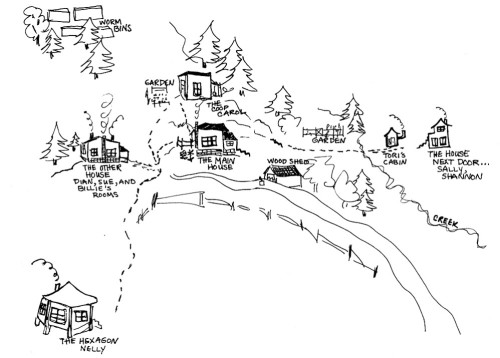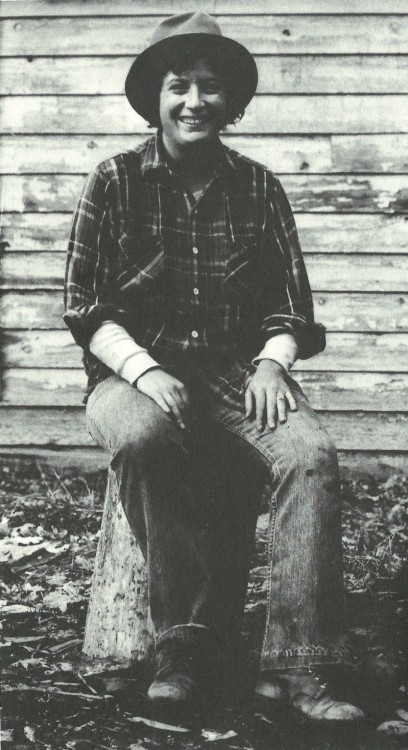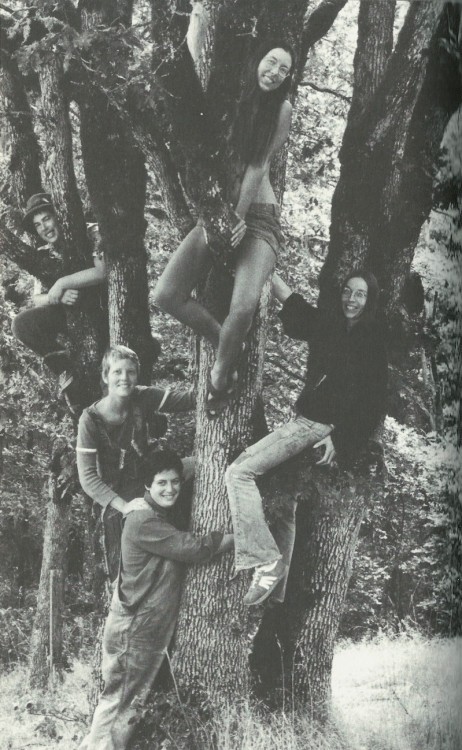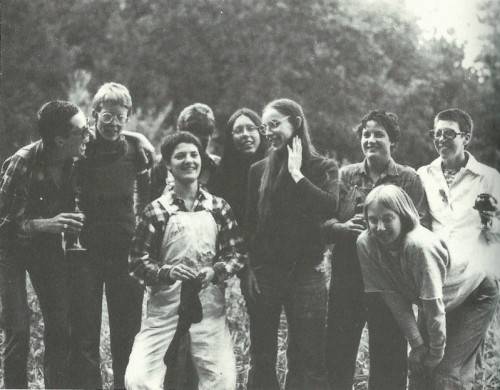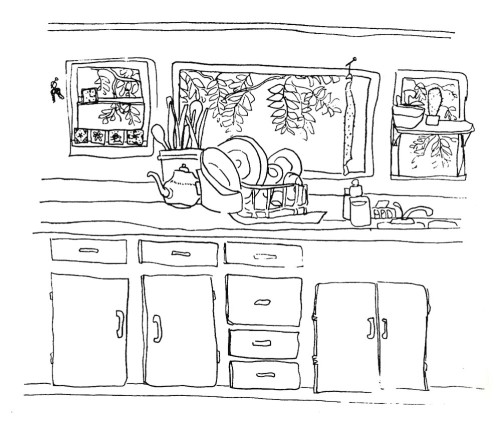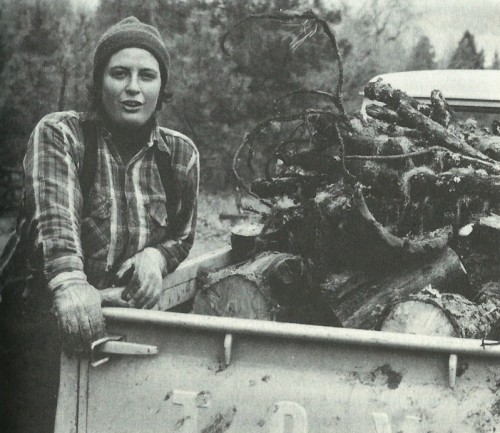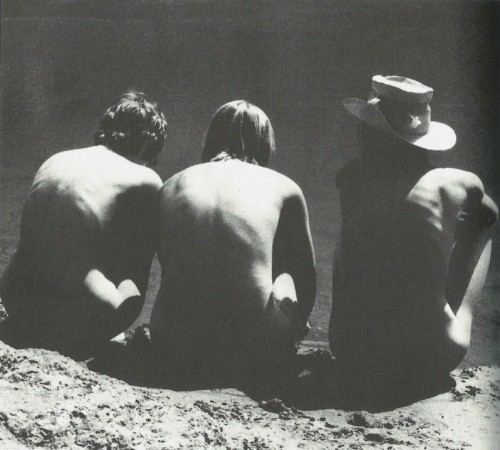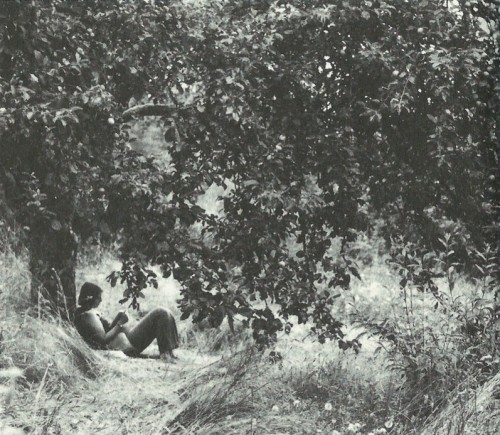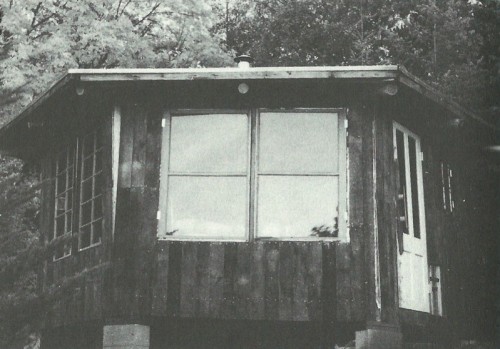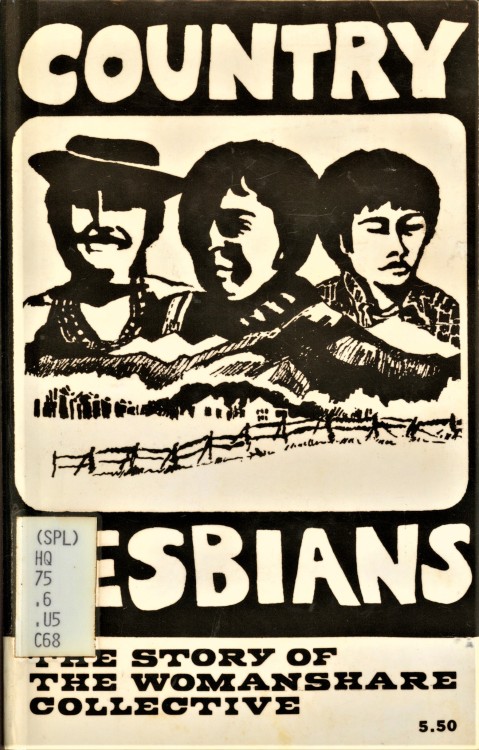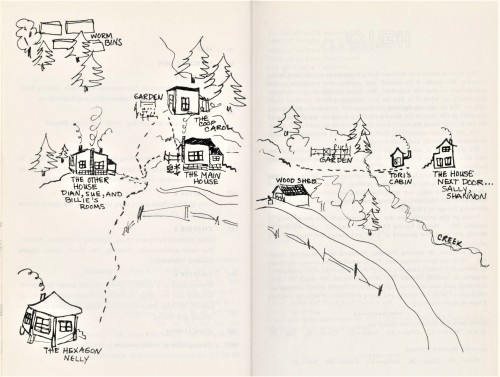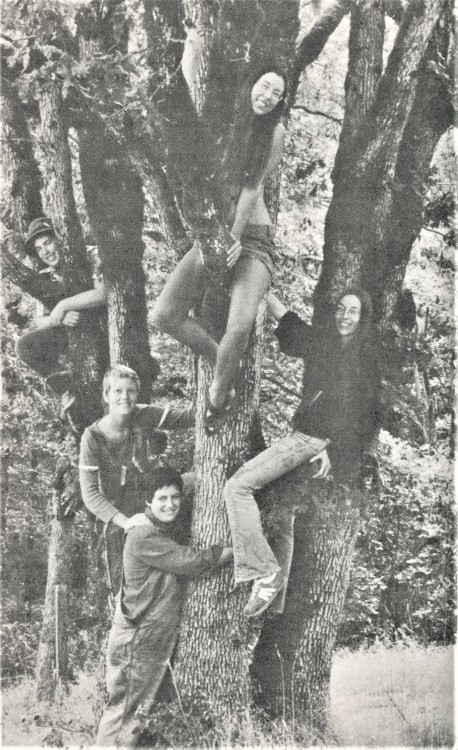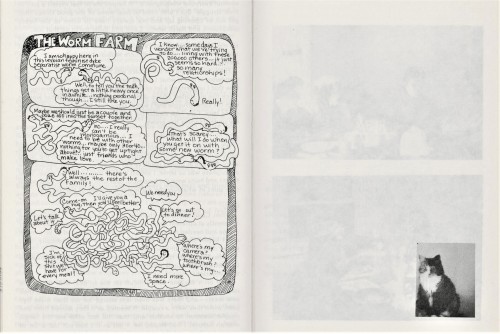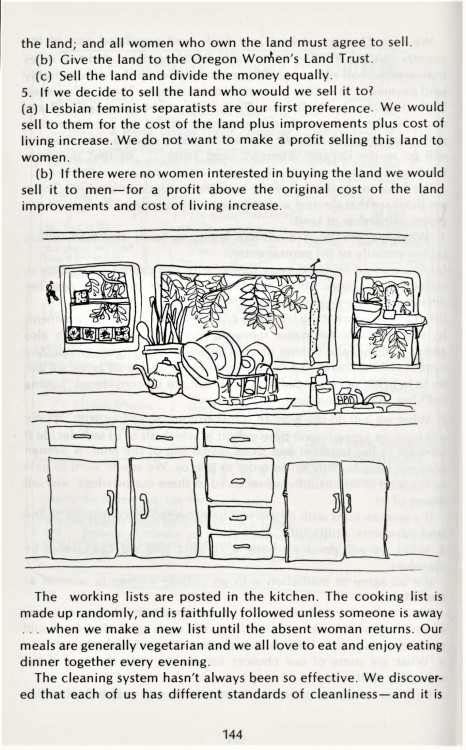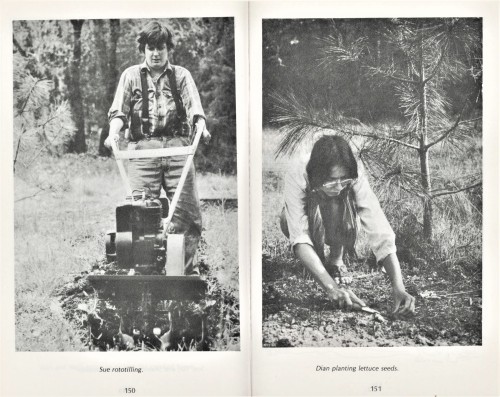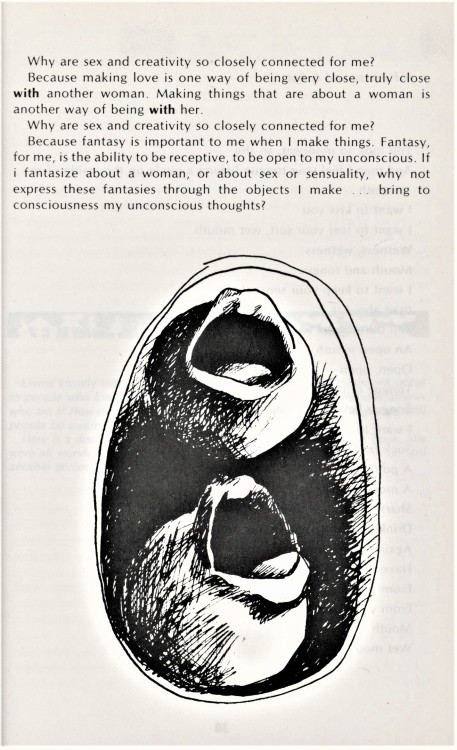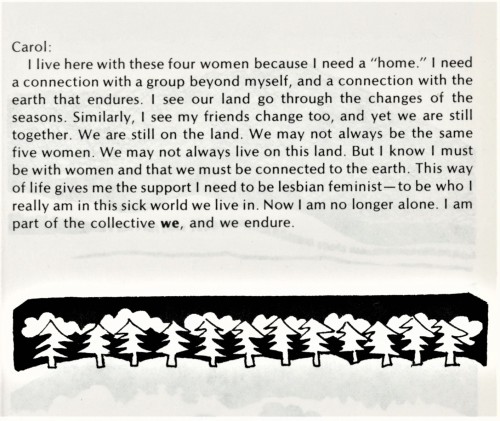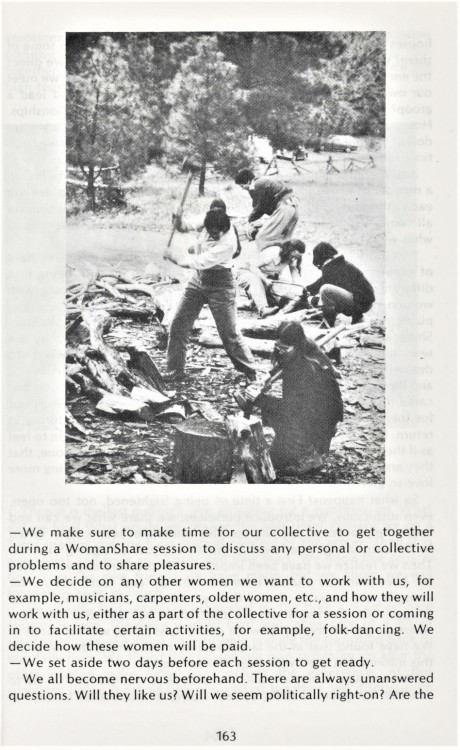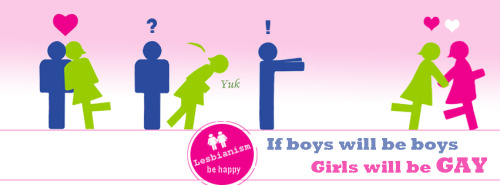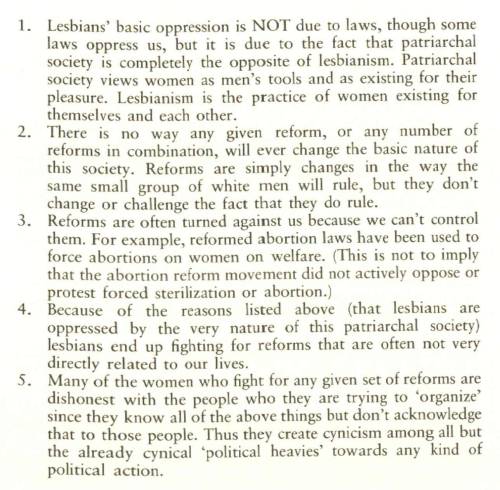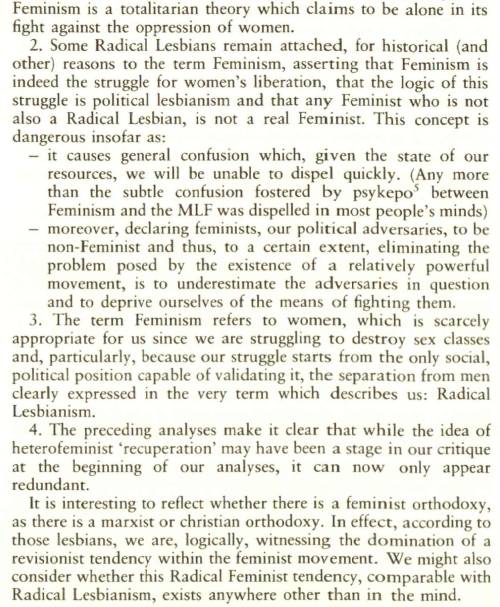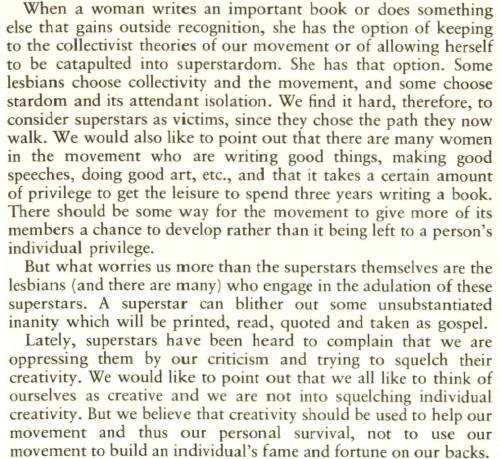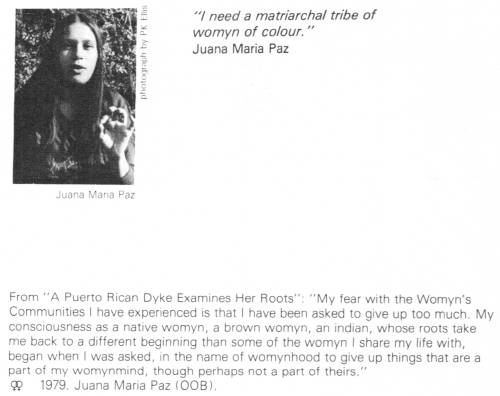#lesbian separatism
Selected photos and illustrations from Country Lesbians: The Story of the WomanShare Collective (1976). Drawings by Billie Miracle. Photos by Carol Newhouse, Donna Pollack, Chez Touchatt, & Dian.
Post link
Staff Pick of the Week
For my Staff Pick, I chose a book titled Country Lesbians: The Story of the WomanShare Collective written jointly by Sue Deevy,Nelly Kaufer,Dian Wagner,Carol Osmer-Newhouse, and Billie Miracle. This book was published in 1976, by WomanShare Books in Grants Pass, Oregon. It was typeset by MaryAnn, who is shown in the back of the book.
In the 1970s, there were many women, usually lesbians involved in the back-to-the-land feminist movement who separated from society in order to escape patriarchy, capitalism, and homophobia. This book is a unique primary source that gives the reader a first-hand look at their collective situated on 23 acres of land in southern Oregon. It includes poetry, transcriptions of conversations, illustrations, letters, journal entries, photographs, tutorials, and more.
TheWomanShare collective wrote this book together after two years of living on the land. It is a text that explores so many different topics, such as friendships, relationships, identity, family, money, power, politics, class, and how they dealt with these personally and collectively.
I chose this text because it feels like a portal into a time, place, and community that has striking differences and similarities to today’s age. At the time the book was published there was estimated to be around 150 of these communities, and today there are a few remaining with varying practices and ideals. Still, Country Lesbians remains one of the only primary sources of its kind on this frontier.
– Clare, Special Collections Undergraduate Assistant
Post link
girls don’t want boys, girls want to dance in the woods with the god dionysus and tear any man who dares to interrupt their bacchic revelry limb from limb
Problems of Our Movement. Alice, Gordon, Debbie, Mary. 1973. For Lesbians Only, A Separatist Anthology. 1988.
Post link
‘Feminism and Radical Lesbianism’, Claudie, Graziella, Irene, Martine. 1981. Translated by Anna Livia in For Lesbians Only: A Separatist Anthology. 1988.
Post link
Problems of Our Movement. Alice, Gordon, Debbie, Mary. 1973. For Lesbians Only, A Separatist Anthology. 1988.
Post link
[A conversation between Janet Meyers, Liza Cowan, Alix Dobkin, and Penny House, from “Transsexuals in the Women’s Movement.” DYKE A Quarterly, no. 5. Fall, 1977.]
Janet: What is so incredible is that a lot of Lesbians seem to be saying to transsexuals, “If this is the way you want to think about yourself, I guess I am obligated to participate in that illusion, because far be it from me to get on anyone’s case, to make a judgment about the self-deception that you are involved in.” That is what is so weird to me, what I find so scary about the way a lot of Lesbians have reacted to the transsexual issue. The attitude seems to be that however someone presents themself, that is the way you are supposed to see them. You are supposed to suspend your perceptions of that person and completely accept, in some kind of mindless way, that person’s evaluation of who they are. It seems to me that this is a very dangerous way of looking at the world. No distinction is made between respecting someone else and suspending your own perceptions. It is always tempting to be passive.
Liza: It is also very tempting to be generous. I think that a lot of Lesbians say they have gone through such a hard time being accepted as Lesbians and now these poor transsexuals are having such a hard time and here we are in the same boat, both oppressed by the same culture. If we recognize them as our sisters it helps everybody. It is very generous and I appreciate that in women, but it is really shortsighted.
Penny: It is misguided. The fact is that you have always in life to make distinctions and judgments. It is not in itself destructive to make a judgment, to make distinctions, to have a conception of right and wrong. Not just right and wrong, but to have any kind of values.
Liza: Especially in the women’s movement, to have an understanding of what is male and what is female seems so basic an issue.
Alix: And yet some Lesbians accept transsexuals as women.
Janet: Most Lesbians come to the women’s movement because they understand that there is something intrinsically other about being a woman and that is necessary for women to get together in order to understand what that means. To get from that, which is the basis of your life, the basis of your politics, and say OK, I guess that’s true, but there are these men who have somehow, by osmosis or something, have somehow absorbed what it means to be a woman, even though they have never been women.
Liza: But they say that hey were born women.
Penny: The line is, “a woman’s soul in a man’s body.”
Liza: What galls me so much is that we are just beginning to understand what it means to be a woman, really just beginning to be able to understand that there is something different that we are not fully conscious of yet about what it means to be a woman, and these men say that they are women, meaning that they know what it means to be a woman, and they are it. And now they want to participate in defining and creating women’s culture.
Janet: I think there is probably something to the point that this is preparatory to dispensing with women entirely. In that sense the transsexual issue concerns me but as far as whether they think they are women or not, or if they should be allowed to have the operation or not, I don’t really care. I think that women, Lesbians, should be very clear about whether we really are willing to say that a man can go to another man, that some sort of technological exchange can go on between them, and then one of them will walk out of the room as a woman. If women are willing to say that these sort of hospital frat parties can produce sisters, I think that is really nuts. I can’t believe that there is that response from Lesbians, even though I understand that it comes out of generous impulses.
Alix: Plus the unwillingness to make a stink about something, to be unpopular, to make enemies.
Liza: Very few feminist newspapers or magazines have said anything about it. It seems to be a closed issue. We know there are women all over the country who are very upset about it, but few say anything in public.
Janet: Men have gotten to the position where they are in the world, and the whole sexual equation that exists, has happened because women have, at least on some level, acquiesced, and have allowed men to control things. Transsexual operations are going to happen, whether women want them to or not, because they are transactions between two men. We have no control over male transactions at this point, but the issue of transsexuals in the Lesbian community exists completely because Lesbians have allowed it to.
Liza: There are lots of Lesbians who genuinely do not understand why this is a problem. The idea is, who cares? What is the difference if these men want to come in and say they are women? So what, it does not hurt us. It seems to me that the reason it is bad is that then it means you do not have an understanding of what is male and what is female, and you don’t understand that you have the right to be in a group that is all women. If somebody wants to have a friend who is a transsexual, that is her business but if she wants to hold an event for women only and have transsexuals come, then I object.
Alix: It makes one wonder about their basic assumptions. Maybe they think that women are totally a product of their environment and once women are treated equally we will be the same as men. I guess that’s the analysis.
Liza: The Olivia analysis is that this man has given up his privileges, has cut off his penis and has a woman’s soul, and so therefore is a woman.
Penny: But any man can say he has a woman’s soul. There’s no way to prove or disprove it.
Liza: To my mind the next logical step would be to say that what a woman is, is a man with no privileges and no penis. So where does that leave us but right back to what men tell us, that women are “inferior” men.
Janet: It is a very liberal idea. It is the accepted, reformist, feminist idea that it is really a question of conditioning.
Liza: It is also that somebody has renounced something, therefore he is equal to you.
Penny: He has come down. A man who has come down to a woman’s level. All that prevents women from being men is being given the privilege of being men. If we had the privilege that men have, would we be men? No!
Liza: One of the reasons Olivia gave for working with Sandy Stone, their transsexual engineer, is that he has renounced his privilege.
Penny: Because he has renounced being a man.
Liza: Therefore they trust him as a woman.
Alix: He has earned his womanhood.
Penny: By living as an oppressed transsexual he has become a woman.
Liza: And therefore the definition of a woman is someone who is oppressed. You understand each other through your oppression and that is the sum total of who you are, that you are oppressed. I think that this is very common in the Lesbian movement. You are so oppressed you must be a woman.

